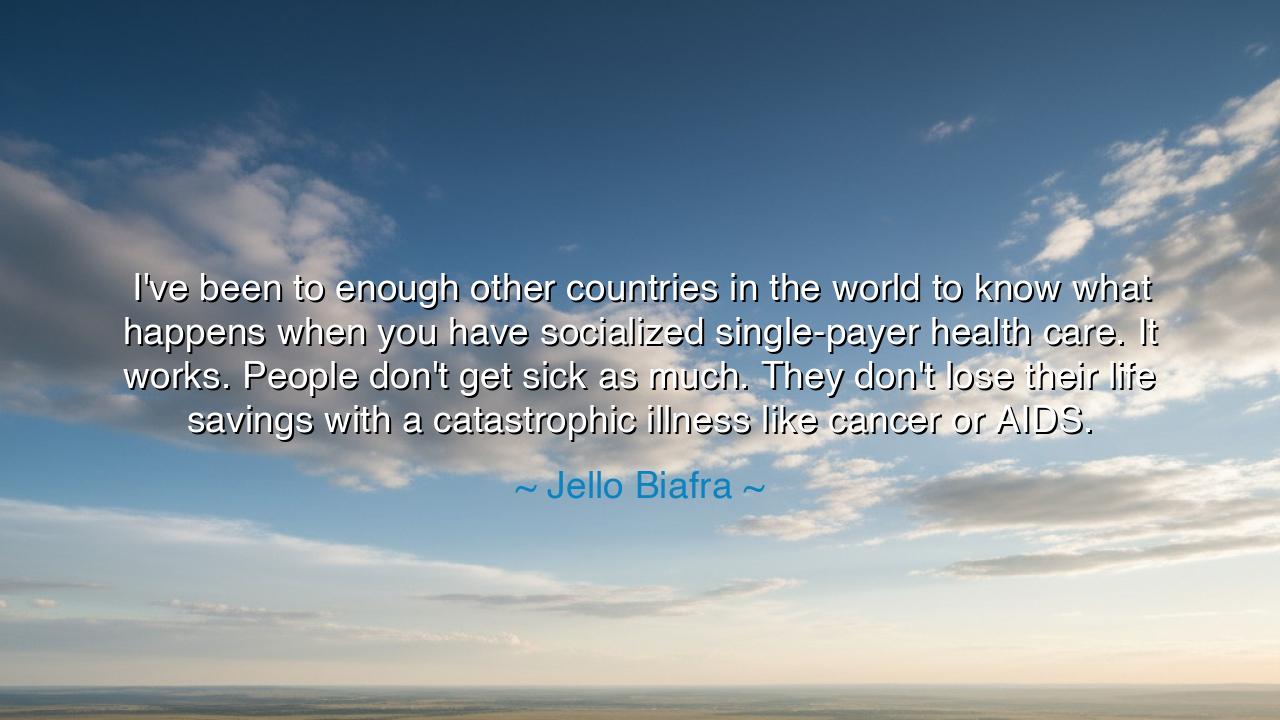
I've been to enough other countries in the world to know what
I've been to enough other countries in the world to know what happens when you have socialized single-payer health care. It works. People don't get sick as much. They don't lose their life savings with a catastrophic illness like cancer or AIDS.






“I've been to enough other countries in the world to know what happens when you have socialized single-payer health care. It works. People don't get sick as much. They don't lose their life savings with a catastrophic illness like cancer or AIDS.” — Jello Biafra
Hear now, O listener, the words of Jello Biafra, a voice both rebellious and prophetic, who through his art and activism saw the deep wounds of society and spoke with the fire of truth. In this declaration, he offers not ideology, but observation — the wisdom born of seeing the world beyond one’s own borders. He speaks of socialized single-payer health care, not as a distant theory, but as a living reality that he has witnessed with his own eyes in lands where compassion and policy walk hand in hand. His words, simple yet resounding, cut through the noise of politics to reveal a principle as ancient as civilization itself: that a community’s greatness is measured not by the wealth of the few, but by the well-being of all.
The origin of this quote lies in Biafra’s journey as a performer, activist, and observer of global cultures. Having traveled across nations, he saw the contrasts between societies where health care is treated as a human right and those where it is sold as a privilege. In his home country, he saw citizens brought to ruin by illness, not for lack of doctors, but for lack of justice. He saw families torn apart by the cruel arithmetic of medical bills, where healing was rationed to those who could pay. But in other nations — in the United Kingdom, in Canada, in the countries of Scandinavia — he saw something different: an order of life where none were abandoned, where sickness did not mean destitution, and where the state became the steward of health, not the merchant of it. From these experiences arose his conviction: that single-payer health care works, and that to deny it is to deny humanity itself.
In this saying, Biafra strikes at the heart of an ancient moral truth — that care for the sick is the highest duty of any society. From the monasteries of medieval Europe, where monks tended to plague victims, to the hospitals founded by Islamic scholars during the Golden Age, the healing of the body has always been a sacred act. It was never meant to be weighed against gold. In ages past, the physician was a servant of mercy, bound by oath to heal without discrimination. But in the modern world, where health has become commerce, and medicine a market, Biafra’s words resound like a call to remembrance — a plea to return to the moral foundation that health is not a commodity, but a right woven into the dignity of life itself.
Consider the story of Tommy Douglas, the premier of Saskatchewan, known as the “Father of Canadian Medicare.” Once, as a young boy, he suffered from a severe leg infection. His family, too poor to afford surgery, prepared for the amputation of his limb — until a compassionate surgeon intervened and treated him for free. That act of mercy changed Douglas forever. As a leader, he vowed that no one in his country would ever again have to choose between poverty and health. From that vow came Canada’s universal health care system, a model now admired across the world — a living testament to what Biafra proclaims: that when nations care for their people, the people grow stronger, healthier, and more united.
Biafra’s words are not only a defense of a system but a rebuke to indifference. He reminds us that illness does not discriminate, and that fortune and misfortune are but threads of the same fabric. A society that leaves its sick to suffer alone undermines its own strength. When one person’s healing depends on wealth, the moral health of the entire nation decays. But when everyone is protected, when medicine is guided by compassion rather than profit, the people flourish. Diseases lessen not because of miracles, but because of solidarity — because citizens, freed from fear, can live fully, seek care early, and share in the blessings of collective well-being.
Let the lesson of this quote, then, be inscribed in the heart: that health is the foundation of freedom. A people constantly burdened by medical debt or untreated illness cannot rise to greatness, for their energy is consumed by survival. But when a nation ensures that no one falls through the cracks, it liberates the creative and spiritual potential of its citizens. To care for the body is to free the mind; to build hospitals for all is to build a future for all.
Therefore, O listener, take these words as both truth and duty: support systems that lift the sick, defend the poor, and heal without prejudice. Demand that your nation remember that the measure of progress is not in profit, but in compassion. Let the healing of one be the healing of all. For as Jello Biafra declares, the proof lies not in argument, but in the living example of nations that have dared to choose mercy — and have found strength. And when every country learns this truth, the world itself shall become a kind of hospital — not of sickness, but of care, where every life, rich or poor, is treated as sacred.






AAdministratorAdministrator
Welcome, honored guests. Please leave a comment, we will respond soon